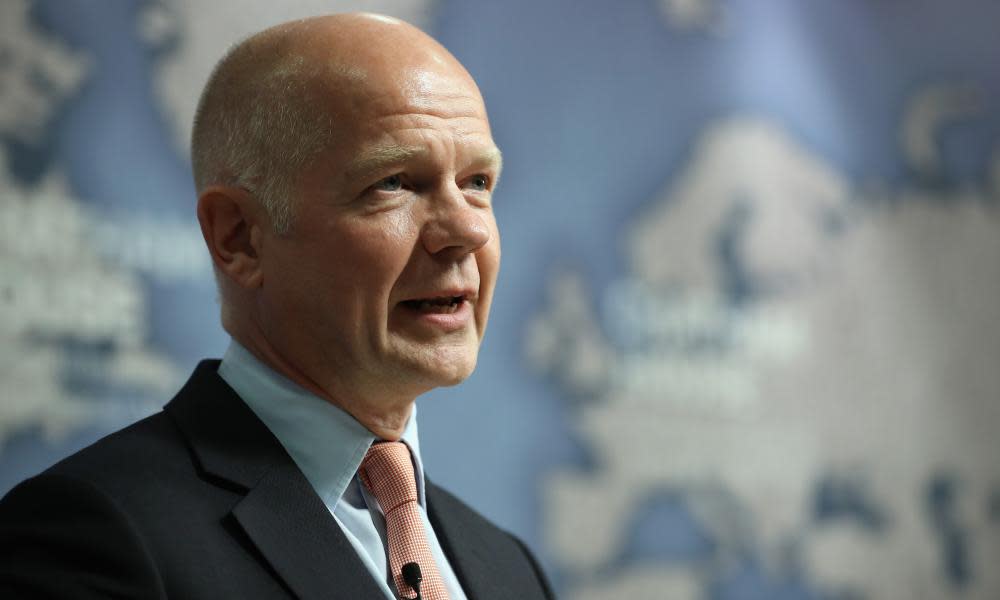UK urged to push for EU foreign policy observer status role after Brexit

The UK has been urged to formally propose a role for itself in the EU’s foreign policy after Brexit by taking up observer status at the twice-weekly meetings of diplomats that shape the bloc’s relations with the rest of the world.
The idea was first suggested earlier this year by Crispin Blunt, the then chairman of the UK foreign affairs select committee, but has subsequently won the support of the former foreign secretary, William Hague, the former Nato secretary general Lord Robertson and this week the former Spanish foreign affairs secretary, Ann Palacio.
Palacio said “a future arrangement could entail ... UK participation in the European Union’s powerful ambassador-level political and security committee, which shapes much of the EU’s foreign policy”.
But she urged the UK to table a version of the Blunt proposal soon, arguing that security, defence and foreign policies should be at the top of the agenda on future EU-UK relations and not “treated as bargaining chips” in talks on economics and trade.
“Such an approach would help to clear the air between the two sides, laying the foundations for stronger, trust-based cooperation in other areas,” she wrote in Project Syndicate. “But, given EU leaders’ current lack of faith in the UK’s will to cooperate, it will be possible only if May’s government takes the lead”.
The issue of UK involvement in foreign policy has been put on the back burner as the EU has ruled future relations cannot be discussed until there has been progress on the terms of the divorce, including on the UK’s exit bill and the rights of EU citizens in Britain.
A Tory MP said he was surprised the UK Foreign Office had not itself been pushing the idea in public. Pointing to UK foreign and defence strengths, he said “if the EU is not prepared to engage in the idea they are engaged in self-flagellation”.
Support for the plan however underlines UK nervousness about its diplomatic clout once it leaves the EU. There are already signs that UK involvement in key foreign policy meetings is beginning to wane, with the UK not attending key decision-making initiatives.
Palacio said Britain risked being “hung out to dry in the international arena” without the EU, pointing to a recent vote at the UN on the Chagos Islands where the UK was referred to an international tribunal after 22 EU members abstained. “Britain needs the EU no less than the EU needs Britain. The question now is how to design a framework for the relationship, once the UK is no longer an EU member,” she said.
Blunt’s proposal, made in a paper first circulated on April 28 at an EU foreign ministers’ meeting in Malta, and handed to the foreign office, proposed the UK was given access to critical decision-shaping meetings, but not to a vote. The twice-weekly political and security committee informs the meetings of the EU external affairs committee chaired by the high representative for foreign affairs, Federica Mogherini.
EU foreign policy is less subject to EU legal treaties than inter-governmental agreement, meaning there may be more flexibility on future EU-UK co-operation to benefit both sides. The UK has already launched legislation to give the UK independent authority to impose sanctions, but has admitted such sanctions are more effective if imposed in conjunction with the EU.
Hague has already backed the Blunt model, discussing it with EU ambassadors in the UK, as “the best proposal” he has seen. The former foreign secretary recently told the Lords EU external affairs committee: “There are many things that cannot be done effectively by Europe without some degree of participation and support from the UK.”
Lord Robertson, the former Labour defence secretary, pointed out parallel models had been created in Nato for non members.“If you are not in the room you are not part of the framework at the beginning,” he said. “That is where we are bound to lose traction, even if all the other EU-27 also consider, quite rightly, that our role is pivotal.”
Lady Ashton, the predecessor to Mogherini, was more dubious than Palacio that the idea will find support in the EU. “A huge amount of goodwill will be needed to keep Britain as close as possible on all these matters,” she said, and questioned whether EU members would be willing to allow the UK observer status.
She said EU member states may respond: “‘Why don’t you just stay in, because what you’re asking for is pretty much the status quo? If you’re going to be a member of the club, that is great, that’s what you get. If you’re not going to be a member of the club, why should you get the benefits of the club?’”

 Yahoo News
Yahoo News 
